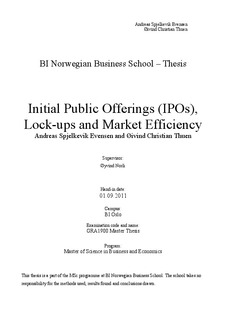Initial public offerings (IPOs), lock-ups and market efficiency
Abstract
In this paper we have examined 174 lock-up agreements in 142 unique firms. A lock-up refers to the prespecified time, usually 180 days, following an IPO, where pre-IPO shareholders enter into an agreement with the underwriter not to sell, or contract to sell any of their shares. We find the Oslo Stock Exchange to be efficient, as there are no significant price reactions around the lock-up expiry, and therefore we find support for the efficient market hypothesis. We also found a permanent increase in trading volume of 85 percent. Further, we found some support for the commitment hypothesis as a potential explanation for the existence of lock-ups. On the other hand, we found no support for the signaling and additional underwriter compensation hypothesis.
Description
Masteroppgave(MSc) in Master of Science in Business and Economics - Handelshøyskolen BI,2012
